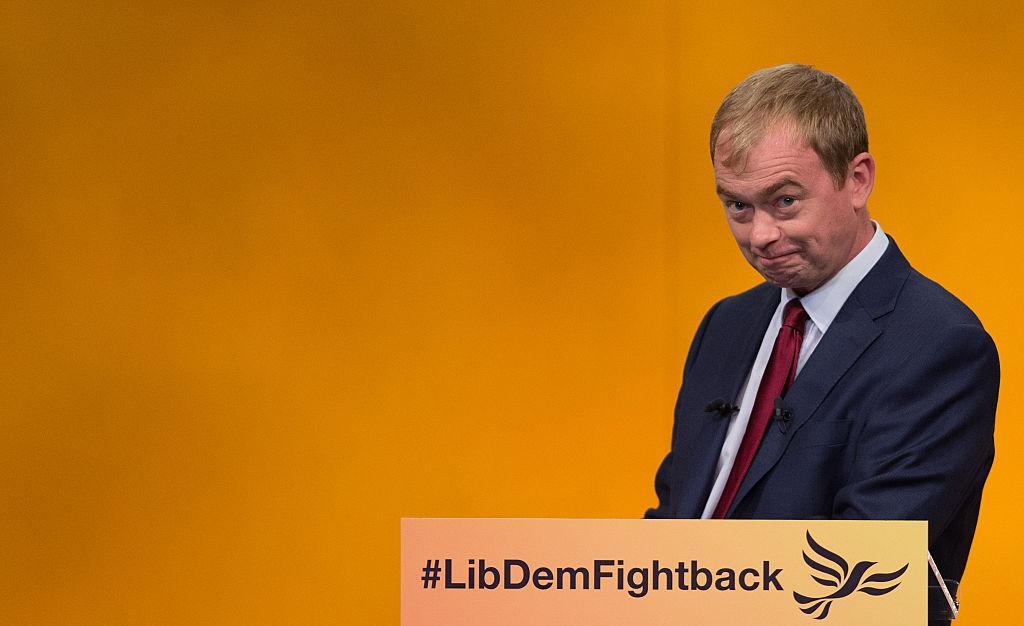The Lib Dems need Labour to split – but Labour needs the Lib Dems to recover
There is no sign of Labour defections to the Lib Dems or of a breakaway by Corbyn’s Labour critics, who would be natural allies of the Lib Dems. Farron can’t say it, but he probably needs Labour to split to give his party’s attempted revival booster rockets


When Britain voted to leave the EU in June, the strongly pro-EU Liberal Democrats were depressed but spotted a silver lining. The 48 per cent of people who voted Remain was a bit bigger than the party’s dismal eight per cent rating in the opinion polls.
Tim Farron, the party’s leader, made a pitch for the Remainers by promising to fight the next general election on a pledge to keep Britain in the EU, whenever it took place. It looked smart at the time: 10,000 people joined the Lib Dems immediately after the referendum. Perhaps the party had finally found a way to climb out of the wreckage of last year’s general election, when it fell from Coalition partner with 57 MPs to having just eight.
When Theresa May ruled out an early election, some senior Lib Dems judged Farron’s pledge dangerous, as it could mean taking the UK back into the EU after it had already left. His promise has been quietly watered down. He now puts the emphasis on a second referendum to approve the terms of Brexit. A policy statement to be approved at the Lib Dem conference in Brighton, which starts on Saturday, commits the party to “continue to campaign for the UK to remain a member of the EU” but not to reverse Brexit if it has happened by the next election.
Just how pro-European to be has always been a tricky issue for the Lib Dems. Nick Clegg went head-to-head with Nigel Farage at the 2014 European Parliament elections, and the Lib Dems saw their number of MPs reduced from 11 to just one. The party’s dilemma is that it needs to appeal to Conservative voters, and so being unashamedly Europhile has a downside.
Although some Lib Dems believe Farron overdosed on the pro-EU language after the referendum, he can hardly be blamed. The Lib Dems’ traditional role as the undisputed third party is under threat from Ukip and the SNP, while the Greens also compete in a crowded market. So Farron must seize every opportunity to grab attention from a media that usually ignores the party and asks: what is the point of the Lib Dems?
Farron’s answer is that there is a big role for his party in the centre ground because Labour is way off the pitch to the left and Theresa May, as her pledge to open more grammar schools shows, is being pulled to the right wing by her own party.
His pitch at the Brighton conference will be that the Lib Dems are the only “open, tolerant and united party”. “Open” means pro-EU; “tolerant” means pro-immigration and is aimed at their target audience; “united” shows the contrast with a Labour Party offering no real opposition to the Conservatives. Farron will plead with the public to “lend us your vote” to prevent 25 years of Tory hegemony, arguing that the Lib Dems are the only party that can beat the Tories in the South West and highlighting recent council by-election gains from Labour in Sheffield and North East Derbyshire. Although Lib Dem losses were predicted at the May local elections, the party gained seats. It is down but not out.
Labour’s turmoil might persuade some people to give the Lib Dems a second look. Lib Dem polling of centre-left voters suggests a third are with Jeremy Corbyn; a third tribally loyal to Labour even if they are not Corbyn fans and a third interested in the Lib Dems. But there is no sign of Labour defections to the Lib Dems or – as yet – of a breakaway by Corbyn’s Labour critics, who would be natural allies of the Lib Dems. Farron can’t say it, but he probably needs Labour to split to give his party’s attempted revival booster rockets. In turn, Labour needs the Lib Dems to recover to have any hope of beating the Tories or mustering enough MPs to oust them in a hung parliament. Labour and the Lib Dems need each other.
Farron is the Tigger of British politics: his party is often invisible, but he always bounces back. Its decision to join the Tories in coalition, and the U-turn on university tuition fees, remains a handicap. In a departure from the Clegg era, Farron will no longer “split the difference” between the Tories and Labour but set out a distinctive pitch. It will mean taking risks, and being ahead of the curve on issues like liberalising the drugs laws on which the Lib Dems have made the weather.
Farron knows it will be a very long road back. He cannot promise his party miracles, only hard pounding. “Our biggest problem is being taken seriously with just eight MPs,” one former MP said. “It is a huge struggle just to get any attention. But the only way is up.”



Join our commenting forum
Join thought-provoking conversations, follow other Independent readers and see their replies
Comments